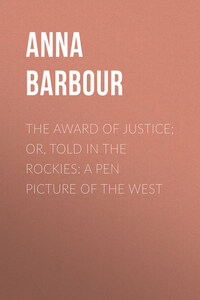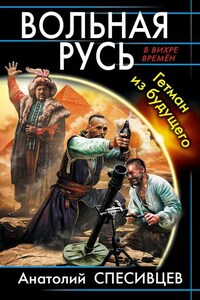The Pacific Express was due at Valley City at 1:45 p.m. Within ten minutes of that time, a spring-board wagon, containing two young men and drawn by a pair of bronchos, suddenly appeared around one end of the dingy little depot. One of the men, dressed in a tweed traveling suit, jumped hastily from the wagon, while the other, who looked like a prosperous young ranchman, seemed to have all he could attend to in holding the restive little ponies, who were rearing and kicking in their impatience at being compelled to stand.
“I’m afraid, Ned,” he said, “that you’ll have to look out for your traps yourself; these little rats haven’t been driven for four days, and they’re feeling pretty frisky.”
“All right, Tom,” responded the other, diving under the seat of the spring-board and bringing out the said “traps,” which consisted of two grips, a rifle case, a set of fishing rods, and, last but not least, a large, square case which he handled with great care, and now held up to his companion saying,
“See that, Tom? that’s my set of cameras; they’re fine too, I tell you.”
“But why do you bother to take them around with you all the time, like that?” inquired his friend.
“Oh,” replied Ned, “I do that so as to be ready to catch any choice scenes I come across; I’m making a collection of views, you know, and I expect to get a good many on this trip. By the way, I got some stunning views over there at your place this morning, just before breakfast.”
“The dickens, you did!” exclaimed Tom, suddenly remembering a ludicrous predicament in which his guest had caught him.
“Oh, yes,” said Ned, “and when I get away at a safe distance I’m going to develop them and send them to you. I’ve got an awfully fine–well, by Jove, if that isn’t just my luck!”
Ned had just deposited his belongings on the depot platform and in doing so, noticed a piece of blackboard propped up against the wall, on which were chalked these words, “Train 3 ours late.” His eyes seemed riveted to the spot.
“What’s the matter now?” asked Tom, who took in the situation at a glance.
“Matter! Why, that blasted train is three hours behind time.”
“Too bad!” said Tom, with a grin; “if I’d only known that I needn’t have driven my horses so hard.”
“Oh, confound those little beasts of yours;” exclaimed Ned, “a little exercise won’t hurt them, but to think of three hours in a place like this! and say, don’t you know how to spell out here?”
“Well,” said Tom, coolly, “I don’t hold myself personally responsible for the wording of that blackboard, but I suppose that’s the phonetic spelling they used to talk about when I lived east; you see we’ve adopted it out here, for we westerners have to rustle lively, and don’t have time for old-fashioned ways.”
“I see,” said Ned, rather sarcastically; “perhaps you can tell me why they don’t ‘rustle’ that train along on time.”
“I suppose,” replied Tom, “it’s on account of that wreck two days ago; you know your train was ten hours late yesterday.”
“Yes,” assented Ned, gazing about him with an expression of intense disgust; “I got here after dark; that’s how it comes about that I never realized until the present moment what a paradise this place is. Valley City! I can’t see more than a dozen buildings here.”
“That’s probably because you’re so near-sighted, my dear boy,” replied Tom; and Ned, who was very sensitive on the subject of his near-sightedness, colored, and readjusted his eye-glasses, while he asked in a tone of despair:
“Well, what am I to do in this beastly place, anyhow?”
“You might take a stroll about the city,” suggested Tom, “if you get lost you’ll have to inquire your way of some of the police. I would be delighted to stay and keep you company, but work on the ranch is rushing and I must hurry back; so I’ll wish you good luck and good-bye.”
“All right, old fellow,” said Ned, shaking hands in a slightly patronizing way, “if you ever get out of this country, and find yourself within the limits of civilization again, just take a run down to the ‘Hub’ and see me.”
“Much obliged,” said Tom, turning around for a parting shot; “I say, Ned, while you’re waiting for the train, you’d better get out your cameras; you might catch some more ‘stunning views’ you know,” and lightly snapping his whip, he started off, the bronchos standing on their forefeet with their heels in the air.
“Good-bye, Tom,” Ned called, after the rapidly retreating spring-board, “if you ever had any brains to lose I’d be anxious about you, but I guess you’re safe enough.”
Tom’s only reply was a crack of the whip, and he and the ponies soon disappeared in a cloud of dust, leaving Ned to survey his surroundings at his leisure.
In the foreground was the low, dingy depot, and on the platform, leaning against the building as though their spinal columns were unable to support them, were two specimens of the genus homo, which were entirely new to the young Bostonian. He gazed at them with undisguised interest, being unable to determine whether they were cow-boys or miners, these being the two classes into which, as he imagined, the western population was about evenly divided. That they immediately classified him, in their western vernacular, as a “tenderfoot,” and a remarkably verdant specimen at that, was not owing to their superior penetration, as it was a self-evident fact.








